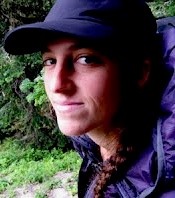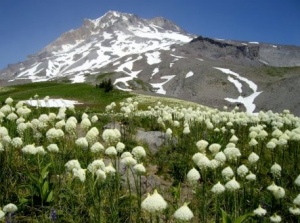
Publisher’s note: We’ve covered the Timberline MTB Park several times since the project became public in April 2010. Last week I was contacted by a member of Bark, a Mt. Hood Forest watchdog group working to stop the project. This guest article was written by Bark Board Member Amy Harwood (she also provided the photo below of Mt. Hood).
—
This week lovers of Mt. Hood are stuck between a rock and a mountain of issues. On the one hand mountain bike enthusiasts are even closer to getting a world-class bike park on the slopes of one of America’s favorite peaks. On the other, the park is one of the best examples in recent history of how profit can rapidly trump concerns about the future of Mt. Hood’s wildlands.
Bark continues to stay engaged in efforts to stop the expansion, despite the risk of being swept onto an anti-bike blacklist. It’s worth stating why:

(Photo: US Forest Service)
Mt. Hood is the most beautiful mountain in the world — or so a lot of people who live in view of it will tell you. On a clear day, those of us stuck behind a window can look out at the pristine skirt of snow and be reminded of the wildness just down the road. But what really makes Mt. Hood the most beloved mountain is the view once you get there. In just a few weeks wildflowers will begin to peek out from under the snow. The alpine meadows will soften the hard edges where mountain meets forest. Martens will scurry between their rock homes, elk will move up into their summer range, and hundreds of different butterflies will occasionally erupt in the sky, just as they have for thousands of years. Our mountain is alive and Bark is committed to speaking up for the creatures that we share it with.
The Timberline bike park is a corporate scheme to have more weeks of the year attracting cars to larger and larger parking areas that have been poured over our remaining wild creeks and meadows.
RLK’s proposal to use Timberline’s slopes for mountain bike trails is not the bike-friendly proposal you might think (links to PDF) – that is, if bikes are an idea in line with your values of environmental stewardship, local power and equity. The Timberline bike park is a corporate scheme to have more weeks of the year attracting cars to larger and larger parking areas that have been poured over our remaining wild creeks and meadows. A ticket to use the resource-intensive chairlifts cost the price of a week’s worth of groceries. And the routes downhill are not the reused ski trails (PDF) you might hope for, but rather a new scar on the face of the mountain. This park is not interested in tapping into Portland’s famous love of all-things bike. It’s a luxury theme park for the dwindling leisure class.
It should be kept in mind why RLK would be investing so much into this development. As the ski season shrinks more and more every year due to the catastrophic shifts occurring on our mountain from the effects of climate change, resorts around the country are desperately beginning to diversify. It’s no mystery that the Cascades will never again be the mountain ecosystems we know them today. Now is the time to be assessing whether more development is an appropriate direction to take. Figuring out how to keep the rich happy is not adaptation; it’s denial.
Above all else, Bark cannot turn a blind eye to the lack of public participation. Unlike so many other aspects of Forest Service management of recreation, the alpine recreation areas are required to have a Master Plan to layout future desired projects. However, these Master Plans do not factor in impacts to the rest of the national forest and are not required to go through a public input process. So, for instance, as federal funding becomes available for the Forest Service to convert old logging roads to bike trails, Timberline’s proposal becomes a disincentive for our forest to get these funds over another forest without a private park. Because the actual users of the forest were never engaged in this process, we’ll never know what other projects could have been possible.
One of the hardest parts for Bark in taking this stance against Timberline’s proposal is the fact that many of our supporters, volunteers and staff are bikers. We believe recreation interests and conservation have powerful alliance when it comes to the future of Mt. Hood. We’ve worked for years with mountain bikers who don’t want their favorite trails to be a tour of the latest logging project and energy development. And we have repeatedly created a platform for the diverse quiet recreation user groups to come together on a vision for Mt. Hood that reflects the people who love it, not the people who want to profit from it.
We remain committed to Mt. Hood’s communities. Humans included.
Amy Harwood is a Bark Board Member and co-founder of Signal Fire. Read more of our Timberline MTB Park coverage here.

